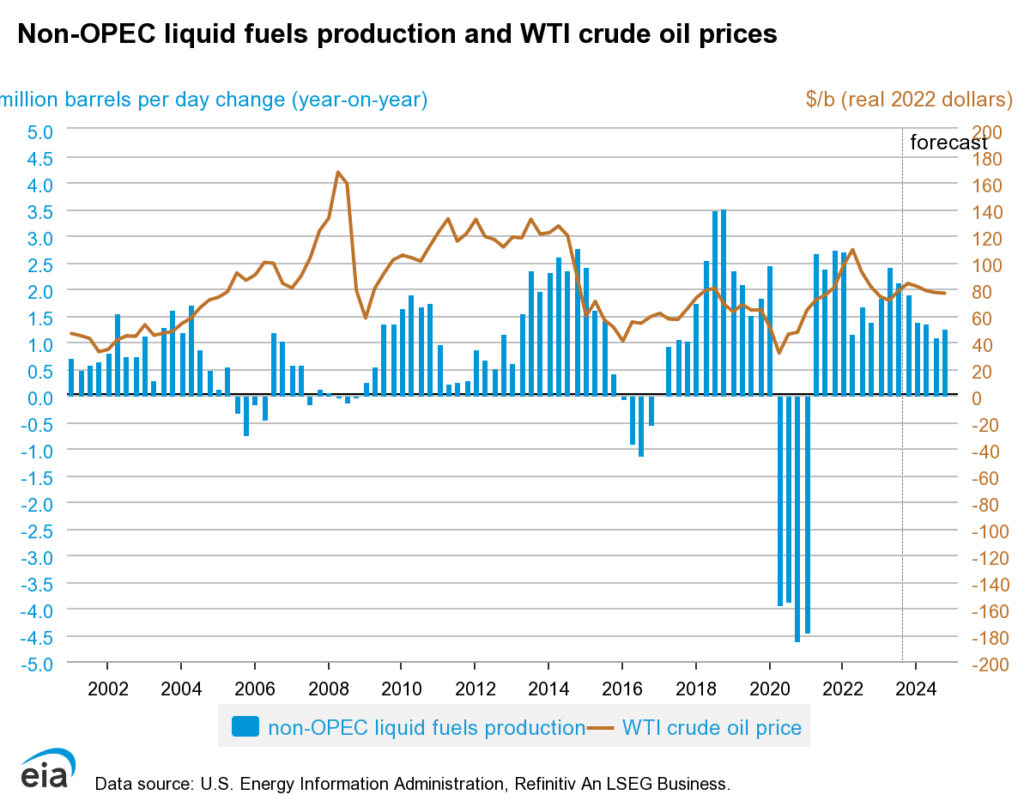OPEC Meeting and Expected Supply Cuts
What are the expected supply cuts in the upcoming OPEC meeting?
The role of Saudi Arabia, a prominent member of OPEC, is expected to be pivotal in any proposed supply cuts during the upcoming meeting. The market is closely observing Saudi Arabia’s stance and potential actions in influencing crude oil supply dynamics. The estimate is for a 1 million barrel cut, but could be up to 2 million barrels.
Update: OPEC agreed to a 1 million barrell cut. More important than the cut is how members comply with the quota. This is a pre-emptive cut due to falling demand. Success of this meeting will depend on compliance.
Saudi Arabia, being a major oil producer, holds significant influence within OPEC and often plays a leading role in shaping the collective decisions of the organization. Any proposed supply cuts by OPEC are expected to be heavily influenced by Saudi Arabia’s policy and production considerations.
For the Saudi’s they would be happy if oil returned to the $85 to $90 range or at a minimum over $80 per barrel of oil. However, the they will face resistence from some members, particularly in Africa due to some dissagreements on the quota.
Recent US EIA data on Wednesday showed a build in US crude oil stocks of 1.6 million barrels versus the concensus of about 950,000. This is inline with a global slowdown and we expect increased pressure on oil prices to the downside.
Our view is that a cut will be announced pushing oil up in the short term, but we maintain our view that oil prices are under pressure due to global economic conditions. In addition, we feel China is slowing down to a greater degree than market forecasts. For example, analyst at the Chineese Bank, CICC, were told not to publish negative economic reports about China.
Expectations from non-OPEC countries in terms of supply cuts
Besides OPEC member countries, the anticipation of supply cuts extends to non-OPEC nations, as their cooperation and contributions form an integral part of the overall efforts to balance the global oil market. The market is keen on the engagement and commitments of non-OPEC producers in supporting supply adjustments. As the chart below from the EIA, this also needs to be factored into any oil forecast:

How do OPEC meetings affect stock and financial markets?
The decisions and actions of OPEC have a substantial impact on both stock and financial markets, as they influence economic dynamics and market sentiment, particularly within the energy and related sectors.
OPEC decisions can influence the stock performances of energy companies, as well as sectors related to oil and gas exploration, production, and transportation. Changes in oil prices resulting from OPEC’s actions can have direct effects on the revenue and profitability of these companies, shaping their market performances.
OPEC meetings often prompt market participants to reassess and adjust their financial positions and strategies, particularly within the commodities and energy sectors. The outcomes and implications of these meetings can lead to shifts in market expectations and investment sentiment.
The Organization of the Petroleum Exporting Countries (OPEC) plays a critical role in the regulation of crude oil prices. OPEC consists of major oil-producing nations and holds regular ministerial meetings to discuss and decide on oil output cuts and quotas. These meetings are highly significant in shaping the global oil market as the decisions made by OPEC have a direct impact on the supply and pricing of crude oil.
OPEC is responsible for coordinating and unifying the petroleum policies of its member countries to ensure the stabilization of oil markets. The organization aims to secure a steady income for oil-producing nations and to provide a consistent supply of oil to consumers. OPEC’s decisions, made during its meetings, greatly influence the global oil market, affecting not only prices but the overall energy landscape.
OPEC, or more accurately OPEC+ that includes Russia, wield influence in the oil market due to the combined volume of its member countries’ oil exports, giving it the capability to affect global oil prices through supply adjustments and production quotas. The decisions made during OPEC meetings directly impact the level of oil in the international market, leading to changes in prices and market dynamics.
The decisions made by OPEC have a far-reaching impact, influencing not only the pricing of crude oil but also affecting the energy strategies of consuming nations and the profitability of global oil companies. The outcomes of OPEC meetings are closely monitored by governments, industries, and investors worldwide due to the significant repercussions they have on the economy and financial markets.
